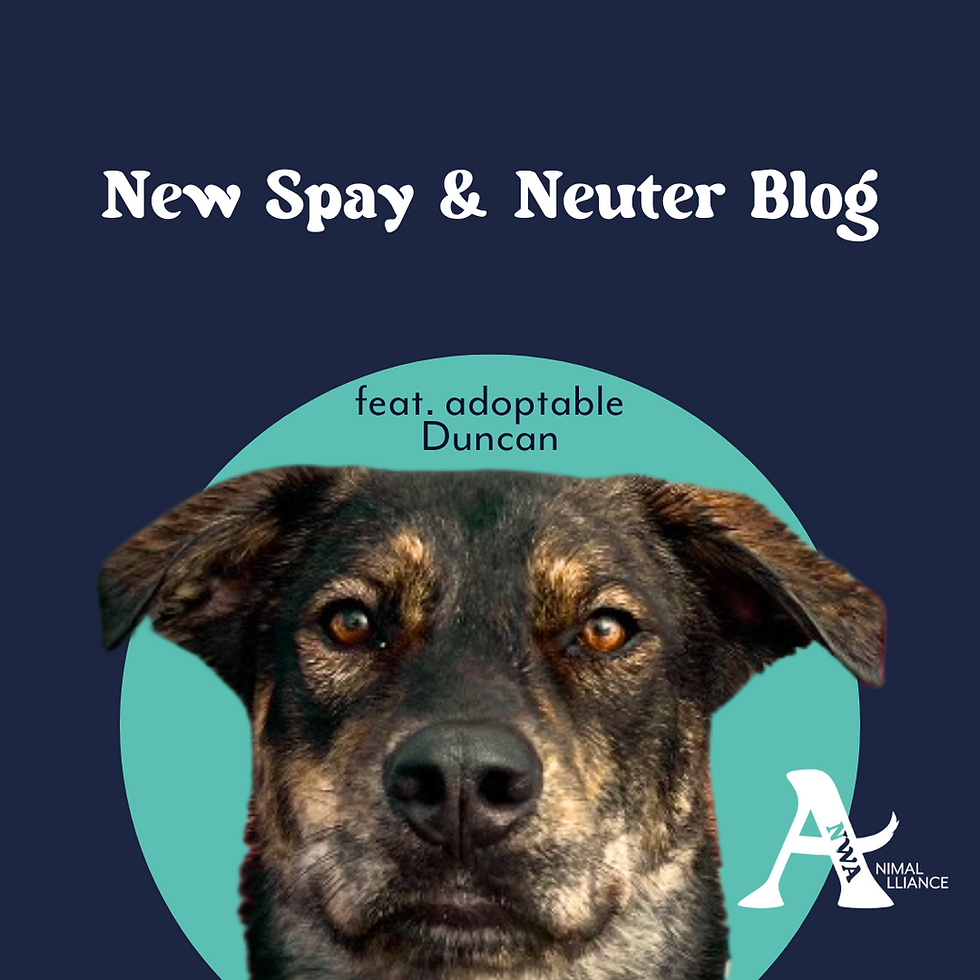The Importance of Spaying and Neutering: How It Benefits Your Pet and Community
- Big Paws
.jpg/v1/fill/w_320,h_320/file.jpg)
- Apr 10, 2025
- 4 min read

Spaying and neutering your pets might not be the most glamorous topic, but it’s definitely one of the most important. These procedures are a quick and effective solution for helping control the pet population, ensuring fewer animals end up in shelters, and bettering the overall animal welfare. Whether you own a cat, dog, or both, there are many reasons why a spay or neuter procedure is a crucial part of responsible pet ownership.
How it Helps
Spaying (for females) and neutering (for males) are simple surgeries that prevent animals from unwanted pet reproduction. But the benefits go far beyond preventing unwanted litters. Let’s look at some of the most significant reasons:
1. Escape Attempts
Despite your best containment efforts, “life finds a way.” Your intact pets can experience an instinctual drive to escape in search of a mate. Intact pets, especially male dogs and female cats, can become highly motivated to escape the house or yard when they sense that a mate is nearby. This can lead to dangerous situations where your pet might wander into traffic, get lost, or encounter other animals that could cause harm.
2. Health Benefits
Spaying and neutering surgeries offer long-lasting positive effects on a pet’s health. For female pets, the birthing process can become difficult or life-threatening, requiring a C-section and immediate medical attention. Long term, spaying eliminates the risk of uterine infections (pyometra) and significantly reduces the risk of breast cancer. Male pets also benefit from neutering, as it reduces the likelihood of prostate problems and eliminates the risk of testicular cancer.
3. Behavioral Improvements
Pets that are spayed or neutered can deter some hormonal or behavioral issues. For males, neutering can help reduce territorial marking, roaming, and aggression toward other male animals. Female pets can typically present fewer behaviors associated with being in heat, like loud vocalizations and attempts to escape the house to find a mate.
3. Overpopulation Issues
Every year, millions of well-behaved pets end up in shelters at no fault of their own like unplanned litters. Overpopulation creates a revolving door of need without any relief. It drains funding, space, and resources that local shelters or rescues don’t have to spare. By spaying and neutering, you’re directly helping reduce the number of unwanted pets and decreasing the strain on shelters and rescue organizations.
4. Euthanasia Risk
According to the American Society for the Prevention of Cruelty to Animals (ASPCA), approximately 3.3 million dogs and 3.2 million cats enter U.S. shelters every year, and sadly, almost 1 million of those pets are euthanized. Open-intake shelters are forced to make the heartbreaking call and open up space for new intakes. Fewer unplanned litters mean fewer animals in shelters, which leads to fewer euthanasias due to capacity issues.
When to Schedule
The right age to spay or neuter depends on the species, breed, and individual health of your pet, but there are general guidelines:
Cats and small dogs: Most veterinarians recommend spaying or neutering cats and small breed dogs around 5 to 6 months of age, before they reach sexual maturity. This helps ensure that they don’t start exhibiting unwanted behaviors like marking or attempting to escape the home to find a mate.
Large male dogs: Large breed dogs may need to wait until they are a little older, around 12 months, as early spaying or neutering could affect their growth and development. It's always a good idea to consult with your vet about the best timing for your dog's breed.
Female dogs: For female dogs, it’s often best to spay them before their first heat cycle. Not only does this reduce the risk of unwanted pregnancy, but it also minimizes the risk of certain cancers and infections that can occur later in life.
How to Get Financial Assistance
Low cost spays and neuters are accessible through various local programs, with some offering free spaying and neutering, such as:
Adopted pets: Many rescues and shelters include a spay or neuter procedure as part of the adoption process for dogs and cats. If a pet isn’t eligible yet, the procedure can be scheduled at a later date.
Existing or purchased pets: Government-funded programs typically offer discounted rates for low-income families, dependent upon the city or country regulations. Additionally, sometimes veterinary clinics and nonprofit organizations run periodic spay/neuter clinics to receive the procedure at a reduced rate.
Spaying or neutering one pet is cheaper and easier than raising a single litter of puppies or kittens—which includes food, vet visits, vaccinations, and finding homes. By spaying or neutering, you’re helping to reduce the overall pet population and improve the livelihood of animals in your community.
Who Can Breed Pets
Are intact pets or breeding ever a good option? Responsible dog or cat breeding preserves breed integrity and working class lineages. However, the keyword there is “responsible.” The vast majority of owners are not equipped to become ethical breeders. Intact dogs and cats require more time, money, and knowledge. Ethical breeders prioritize health, genetics, and temperament—not making money. It is a privilege and responsibility to breed pets.
Where to Get Animal Welfare Support in NWA
Animal welfare takes a community. Spay and neuter practices are crucial for the health, safety, and well-being of your pet, as well as the community at large. These simple procedures can prevent health problems, reduce unwanted behaviors, and curb the pet overpopulation crisis. If you're unsure about the best time to spay or neuter your pet, or if you have any concerns, reach out to your veterinarian.
Still got questions? We got you. The Northwest Arkansas Animal Alliance is a coalition of shelters, rescues, and advocates dedicated to improving animal welfare in NWA through collaboration, resource-sharing, and community engagement. By working together, we aim to create lasting, systemic change to save more lives.



Comments